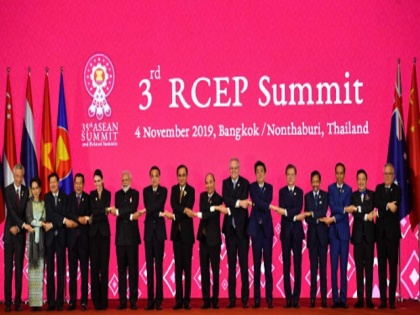India had its economic rationale to walk out of RCEP
By Lokmat English Desk | Published: November 5, 2019 02:30 PM2019-11-05T14:30:56+5:302019-11-05T14:32:10+5:30
On Monday India made a big decision to stay out of RCEP and it might have it's economic rationale but this decision has affected India's geopolitical ambitions.

India had its economic rationale to walk out of RCEP
On Monday India made a big decision to stay out of RCEP and it might have it's economic rationale but this decision has affected India's geopolitical ambitions. China seems to be the major winner at present and is aiming to become Asia's unchecked dominant power with the trade and supply chain networks connected to Asean.
Evan Feigenbaum of Carnegie Endowment for International Peace (CEIP) tweeted soon after India made it's decision public;
1/4: THREAD: Just to be a little cheeky, today, India seems to be dropping out of RCEP, meaning we are likely to have two large trade and investment “blocs"—TPP and RCEP—setting rules and standards for the economic area in this region but with NEITHER the US nor India included.
— Evan Feigenbaum (@EvanFeigenbaum) November 4, 2019
The decision by India was a difficult call and deliberated in recent months at the highest level in the government. It's decision at the last moment to pull back is unlikely to give a positive signal in the region. There's some tension with India's Indo-Pacific policy might be affected adversely because it is no more part of the trade table. In some of these countries this perception might be gaining ground, meaning that Indian coverage in the coming days will have to be more substantial.
India will now pursue bilateral trade agreements with key Asian countries. The first likely to be a Australian trade agreement, but perhaps not New Zealand. Sources reported that India has picked Indonesia, Vietnam, Australia, Japan and Singapore it's key economic partners in this region. The Asean FTA in India will continue, although renegotiated, just as it is with Thailand and even South Korea. However, leading sources indicated that India, like Trump in the USA, would like some time in Asia to follow bilateral arrangements.
Nearly every partner of Asean and Japan wanted India to be part of RCEP. Japanese Prime Minister Shinzo Abe requested PM Modi personally to join RCEP. In order to balance China, other Asean countries have always supported India to be a part of the deal.
Since past seven years, India has been negotiating RCEP, out of which the five years has been in the Modi-led government. The Indian government has been in disagreement for years with the RCEP. In the mean time, the world economy situation has changed, the Indian economy is facing difficulties that also affect Indian governments viewing trade and investment.
However, as the negotiations gained momentum, India's negotiators and their political leaders realized the fact that the FTA was not equal between India and China, where China refused to agree on one of India's great issues. Aslo the Indian officials negotiations didn't help as they were very poor and indefensible concessions.
According to official sources, the stumbling blocks were insufficient protection from import surges, insufficiently distinctive conditions with Chinese countries, potential circumvention of rules of origin and keeping base year as 2014, nor was there any credible assurances on market access and non-tariff barriers. In the recently held Mahabalipuram informal summit between Xi Jinping and Modi, Indian officials quoted the Chinese president as agreeing to address their concerns about India's RCEPs to the media. That too didn't work out.
"We made a big mistake, we should have pulled out before the 29th round," said a source in the government. India, he said, was the unusual one out there in many ways while all the Asean countries are part of the global supply chains which have better sophisticated systems than India No one of these countries has an issue as India does with China's bottom lines because India is actually a huge market at the end of the day. India could have taken measure to enhance it's systems, regulatory mechanisms and infrastructure behind its frontiers to make itself more trade-friendly, but it didn't.
Nonetheless, top-level sources have said India will have been the strategic subsidiary of China forever if RCEP was signed at this stage. "In the domain of defense, we can not demonstrate strategic clarity about China but make ourselves a junor player in economy and trade," sources said. "It is rising moment of India today."
(With inputs from agencies)